10 Caregiving skills and how to improve them

Caring for someone in need is a noble and challenging responsibility. Whether you have a team of veteran professional caregivers or new hires, improving their caregiving skills is crucial to delivering the best possible care.
This article will explore the essential caregiving skills and offer insights on how to be a good caregiver, guaranteeing that your organization’s caregiving services are as effective and compassionate as possible.
What are the key responsibilities of caregivers?
Caregivers play a crucial role in giving physical, emotional, and often medical support to individuals who require help due to illness, disability, or age-related needs.
Their responsibilities can vary depending on the specific situation and the level of care required, but here are some key responsibilities caregivers typically have:
1. Assistance with Activities of Daily Living (ADLs): Caregivers help with basic tasks such as bathing, dressing, grooming, toileting, and feeding. They can also help with mobility if necessary.
2. Medication Management: Caregivers verify that their patients take prescribed medications on time, in the correct dosage, and follow any special instructions.
3. Meal Preparation: Planning and preparing nutritious meals is essential, taking into account any dietary restrictions or preferences.
4. Housekeeping and Cleaning: Caregivers often help with light housekeeping tasks, including keeping the living space clean and organized.
5. Transportation: They can offer transportation to medical appointments, therapy sessions, or other essential errands.
6. Companionship: Giving emotional support and companionship is a vital role of a caregiver. This can help alleviate feelings of loneliness and isolation for patients.
7. Monitoring Health: Caregivers keep an eye on the patient’s health and well-being, looking out for any changes or signs of distress.
8. Safety: Securing a safe environment is part of the caregiver's role, which can include preventing falls, managing hazards, and helping with mobility.
9. Supporting Mobility: Caregivers can help people with physical limitations move around safely, which could involve the use of mobility aids.
10. Communication: Effective communication with healthcare professionals, family members, and the person being cared for is essential to verify everyone is informed and on the same page regarding the care plan.
11. Emotional Support: Having emotional support, empathy, and companionship can make a significant difference in the emotional well-being of the person receiving care.
12. Advocacy: In some cases, caregivers may need to advocate for the person in their care, making sure they receive appropriate medical care and services.
13. Record Keeping: Keeping detailed records of the individual's condition, medications, and any changes in their health is important for tracking progress and communicating with healthcare providers.
14. Respite Care: Caregivers may need to arrange for short breaks (respite care) to prevent burnout and guarantee they can continue delivering care effectively.
15. End-of-Life Care: In certain situations, caregivers give comfort and support to individuals in their final stages of life, including pain management and emotional care.
It's important to note that caregiving responsibilities can be physically and emotionally demanding. Caregivers often need to balance these responsibilities with their own well-being, which is why self-care and support systems are crucial for those in this role.
The specific tasks and responsibilities may vary based on the individual's needs, so flexibility and adaptability are key traits for caregivers.
Caregiving skills # 1 - Empathy
Empathy is a critical skill for caregivers. It involves the ability to understand and share the feelings of the person in their care. This skill fosters trust, comfort, and a strong emotional connection, making the caregiving experience more comforting and supportive. For the caregiver, having empathy helps build meaningful relationships, reduces stress, and creates a positive caregiving environment.

To improve empathy, consider taking courses or workshops on active listening. This will help you develop a deeper understanding of the emotions and needs of the person you're caring for.
If you’re looking for some options, consider EdApp’s Operating with Empathy training course. It dives into the different ways your caregivers can exhibit empathy for the people they’re taking care of. It gives some examples of how to handle situations in the best way possible and how to think from another perspective.
Start your team’s empathy training with EdApp today.
Caregiving skills # 2 - Patience
Patience is another one of those skills a caregiver needs to have. It entails the ability to remain calm and tolerant in the face of challenges, delays, or difficult situations. Caregiving often involves unpredictable situations and dealing with individuals with various needs.
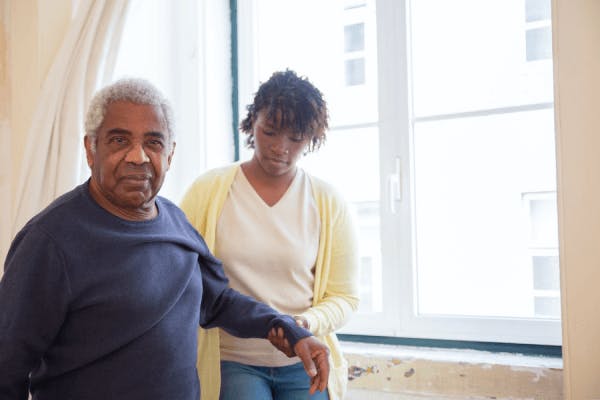
Patience is essential to maintaining a calm and supportive environment. Improved patience reduces stress and makes sure that caregivers can offer effective care even in challenging circumstances.
Enhance patience by practicing mindfulness and relaxation techniques regularly. These practices can help them stay calm in the face of challenges and reduce frustration.
Caregiving skills # 3 - Effective Communication
Effective communication is key in caregiving. It involves the ability to convey information clearly and to listen actively. Open and clear communication helps caregivers understand the individual's needs and preferences, convey information to healthcare professionals and family members, and reduce misunderstandings. Better communication leads to improved care and a smoother caregiving experience.

Join care worker training or communication workshops, or seek guidance from professionals to refine your team’s communication skills. These workshops can teach them how to convey information more clearly and listen actively.
Caregiving skills # 4 - Organization and Time Management
Organization and time management are vital skills for caregivers, as they often have a ton of tasks and appointments to manage. Being organized guarantees that nothing is overlooked and that the person receiving care gets the support they need. Efficient organization and time management reduce stress and help caregivers maintain a balanced life outside of caregiving.
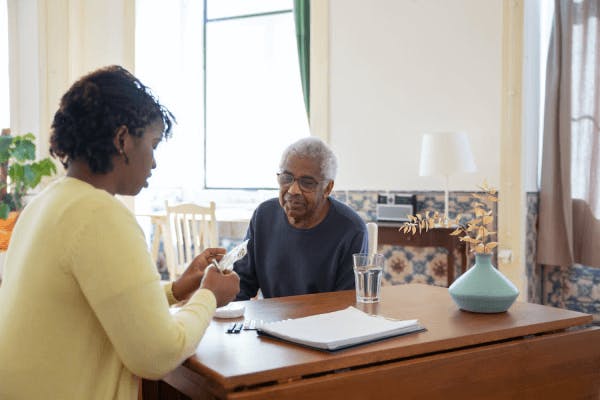
Use organizational tools such as calendars, apps, health training software, and to-do lists. These tools will help your caregivers stay on top of caregiving responsibilities and manage their time more effectively.
Caregiving skills # 5 - Adaptability
Adaptability is another essential skill. It is the ability to adjust to new conditions and changes in circumstances. Caregiving can be unpredictable, with varying needs and challenges. Being adaptable lets caregivers respond effectively to changes in the care environment, reducing frustration, increasing problem-solving abilities, and fostering resilience.
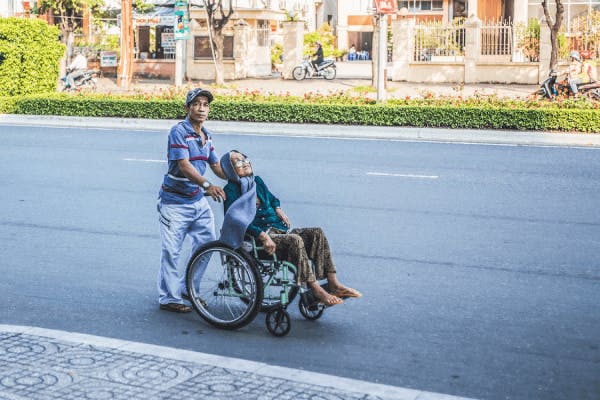
Embrace change and seek opportunities for personal growth and learning. By being open to new experiences and challenges, they can become more adaptable in their caregiving role.
Caregiving skills # 6 - Self-Care
Self-care is crucial for caregivers. It refers to activities and practices that promote one's physical, mental, and emotional well-being. Caregivers often neglect their own needs, leading to burnout. Prioritizing self-care confirms that caregivers remain physically and emotionally healthy, allowing them to continue their caregiving responsibilities effectively.

Allocate time for relaxation, exercise, hobbies, and social connections. This can help stabilize your caregivers’ emotional and mental health needs as well as unlock their happy hormones.
Caregiving skills # 7 - Problem-Solving
Problem-solving skills are essential skills to be a carer for addressing unexpected challenges in caregiving. It’s the process of finding solutions to difficulties or issues that may arise. Caregivers often need to troubleshoot and make decisions on the spot. Improved problem-solving leads to reduced stress, enhanced decision-making, and a sense of competence in giving care.
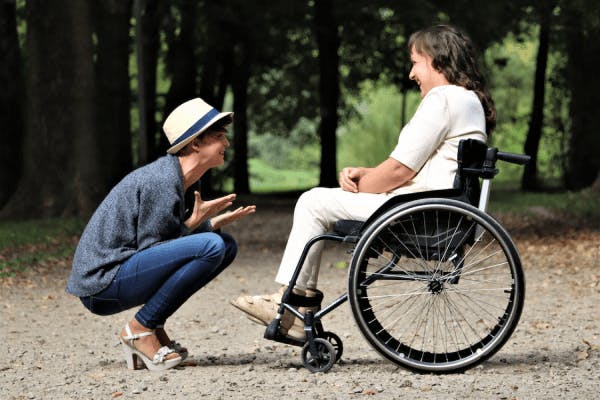
Learn from experienced caregivers by seeking advice and insights from support groups or attending caregiver workshops. These resources can deliver valuable problem-solving strategies.
Caregiving skills # 8 - Medical Knowledge
Depending on the level of care needed, caregivers may require some medical knowledge. It involves an understanding of relevant medical conditions and treatments. Having medical knowledge allows caregivers to give better-informed care, communicate effectively with healthcare professionals, and respond appropriately in medical emergencies.

Consider enrolling them in relevant medical courses or workshops to enhance their understanding of medical conditions and treatments. Knowledge in this area will help them give better care.
Caregiving skills # 9 - Emotional Resilience
Emotional resilience is the ability to cope with stress, adversity, and emotional challenges effectively. Caregiving can be emotionally challenging, and emotional resilience helps caregivers manage their own emotional well-being. Enhanced emotional resilience leads to reduced emotional burnout, better coping strategies, and improved mental health.
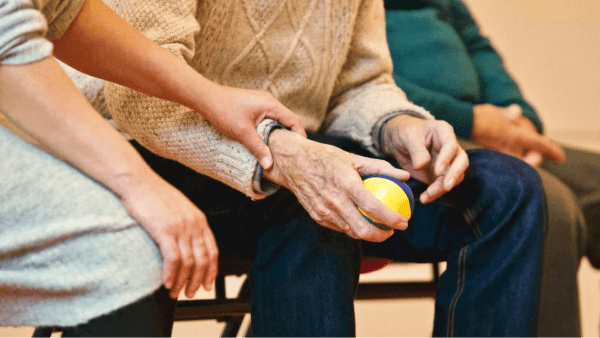
Seek support from therapists or join support groups for caregivers. These resources can give them tools and coping strategies to build emotional resilience.
Caregiving skills # 10 - Cultural Sensitivity
Cultural sensitivity is a fundamental skill for caregivers in a diverse world. It involves being aware and respectful of the cultural background and preferences of the person in their care. Cultural sensitivity promotes a more inclusive and understanding caregiving environment and improves the quality of care given.

Read books or take courses on cultural competence and sensitivity. Understanding the cultural backgrounds and preferences of the person in their care will allow them to give more culturally competent care.
EdApp is a mobile learning management system designed for today’s digital habits, delivering more engaging and effective micro-learning directly to learners anytime and anywhere.
Sign up for this caregiving skills training tool today.
Author
Stephanie Escuadro
Stephanie is an eLearning content writer for EdApp, a microlearning solution designed for today's digital habits. She creates content about cutting-edge learning technologies and resources to help companies deliver great training experiences. When not absorbed in writing, she spends her time taking care of her dog and binge-watching.
